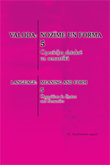Rezultatīvi latviešu valodā
Resultatives in Latvian
Author(s): Benita RiaubienėSubject(s): Language and Literature Studies, Theoretical Linguistics, Applied Linguistics, Baltic Languages
Published by: Latvijas Universitātes Akadēmiskais apgāds
Keywords: rezultatīvi; sekundāri predikatīvs komponents; saitiņa; priedēklis; vieta teikumā; apzīmētājs;
Summary/Abstract: Nominal semi-predicative components usually are divided into depictives and resultatives that are formed of verb and adjective, participle or prepositional word-combination. Depictives express a state that holds during the reference time of the event encoded by the main predicate (The sun rose red.). Resultatives express a state which is interpreted as a result of the state encoded by the main predicate (The bridge is painted red.). Nominal predicates also can have a meaning of result. That’s why it is necessary to put forward criterions to separate them from resultative semi-predicative components. Transitive verbs in Latvian are independent, it’s impossible to replace them with a copula. Almost all intransitive verbs and a part of reflexive verbs that are used together with adjectives in the sentence are used as copulas. Verbs which together with adjectives do not have big informative load are used as copulas. Resultative constructions in Latvian usually are made by prefixed verbs, because prefixes indicate that activity has concluded. At the same time unprefixed verbs can be used to express that activity has finished. Verbs of cooking, painting, cleaning, filling and emptying without prefixes are more often used ones.The place of resultative semi-predicative components in sentence is analysed. In active voice sentences their place is not fixed as strongly as it is in passive voice sentences. Resultative semi-predicative components can take a place of attribute.
Journal: Valoda: nozīme un forma
- Issue Year: 2014
- Issue No: 5
- Page Range: 97-112
- Page Count: 16
- Language: Latvian

